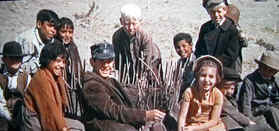A possible footnote to movie history.
The excellent Michael Reeves horror film Witchfinder General was released in 1968. It includes a chilling scene in which some English village children circa 1640 use the ashes left behind by the burning of a witch to roast a few potatoes:
A year later, Sam Peckinpah's The Wild Bunch was released.
This could be written off as an odd coincidence except for the fact that when Peckinpah travelled to England in 1970 to make Straw Dogs, he hired as his cinematographer a then relatively obscure DP named John Coquillon, whose only previous claim to fame was the excellent work he had done on Witchfinder General. Supposedly it was Reeves' mentor Don Siegel who showed the film to his pal Sam.
Of course the fact that Peckinpah saw Witchfinder before making Straw Dogs is no proof that he saw it before making The Wild Bunch, although he certainly could have, even without the recommendation: It was released in the US by AIP in 1968, as The Congueror Worm.
The timeline is suggestive but obscure. But the shots themselves, and their implications within the two films? A damn good match, if you ask me. Don't forget you read it here first.
Sunday, June 28, 2009
"Witchfinder General" and "The Wild Bunch"
Subscribe to:
Post Comments (Atom)




3 comments:
There's an essay on Michael Reeves, director of Witchfinder, in the Iain Sinclair book "Lights out for the Territory", which I have been seeking unsuccessfully on my shelves.... May have lent it to a friend. Found out, BTW, that there's a joint appearance by Alan Moore, Michael Moorcock, and Sinclair at the British Library next week....
Casting about on the internet in hopes of a reference to the essay, I came upon this, at http://www.kamera.co.uk/reviews_extra/witchfinder_general.php:
Witchfinder General's narrative of corruption and revenge is a straightforward transplant of Western genre themes to the woods and rural towns of seventeenth century England, and Witchfinder's kinship with the B-grade Western cinema of Anthony Mann, Budd Boetticher, and early Sam Peckinpah — although Witchfinder slightly predates the violent nihilism of The Wild Bunch (1969) — is clear to see. It's no coincidence that Witchfinder cinematographer John Coquillon would later photograph several films for Peckinpah, including Pat Garrett and Billy the Kid (1973). Although Witchfinder General's narrative seems a bit pedestrian today, in the context of its era the film had additional importance for the generational division represented in the clash between the elder, ethically compromised Price and the youthful, vindictive Ogilvy. In that context, Reeves' sudden death after Witchfinder must have intensified its pessimistic and morose message.
Reeves is quoted in the special features describing the film as "the first British Western."
Neat.
Post a Comment